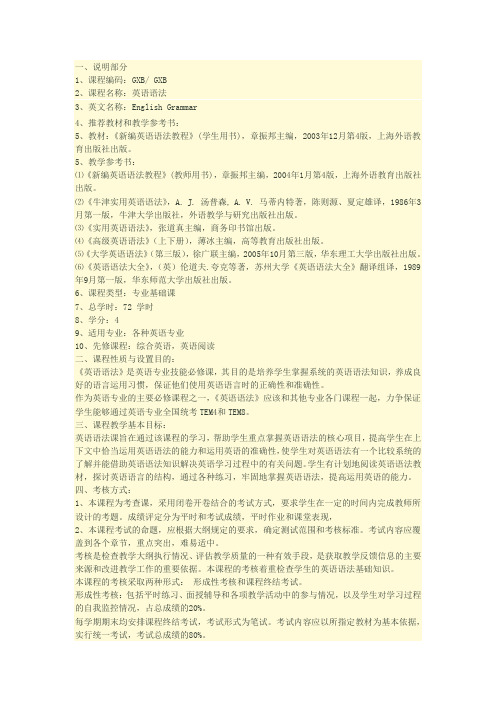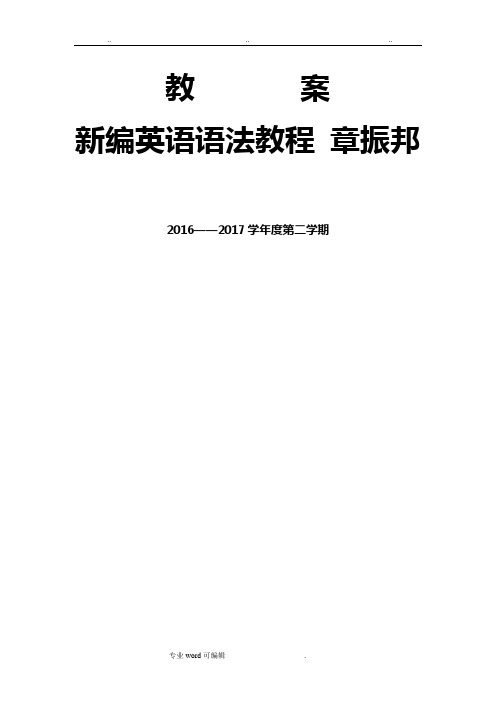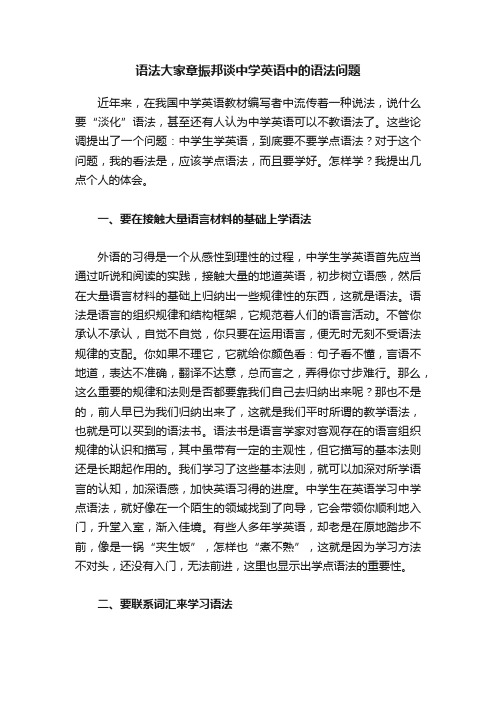章振邦《新编英语语法》Lecture_17&18情态助动词和半助动词教学课件
章振邦《新编英语语法教程》教学大纲

1、课程编码:GXB/ GXB2、课程名称:英语语法3、英文名称:English Grammar4、推荐教材和教学参考书:5、教材:《新编英语语法教程》(学生用书),章振邦主编,2003年12月第4版,上海外语教育出版社出版。
5、教学参考书:⑴《新编英语语法教程》(教师用书),章振邦主编,2004年1月第4版,上海外语教育出版社出版。
⑵《牛津实用英语语法》,A. J. 汤普森, A. V. 马蒂内特著,陈则源、夏定雄译,1986年3月第一版,牛津大学出版社,外语教学与研究出版社出版。
⑶《实用英语语法》,张道真主编,商务印书馆出版。
⑷《高级英语语法》(上下册),薄冰主编,高等教育出版社出版。
⑸《大学英语语法》(第三版),徐广联主编,2005年10月第三版,华东理工大学出版社出版。
⑹《英语语法大全》,(英)伦道夫.夸克等著,苏州大学《英语语法大全》翻译组译,1989年9月第一版,华东师范大学出版社出版。
6、课程类型:专业基础课7、总学时:72 学时8、学分:49、适用专业:各种英语专业10、先修课程:综合英语,英语阅读二、课程性质与设置目的:《英语语法》是英语专业技能必修课,其目的是培养学生掌握系统的英语语法知识,养成良好的语言运用习惯,保证他们使用英语语言时的正确性和准确性。
作为英语专业的主要必修课程之一,《英语语法》应该和其他专业各门课程一起,力争保证学生能够通过英语专业全国统考TEM4和TEM8。
三、课程教学基本目标:英语语法课旨在通过该课程的学习,帮助学生重点掌握英语语法的核心项目,提高学生在上下文中恰当运用英语语法的能力和运用英语的准确性,使学生对英语语法有一个比较系统的了解并能借助英语语法知识解决英语学习过程中的有关问题。
学生有计划地阅读英语语法教材,探讨英语语言的结构,通过各种练习,牢固地掌握英语语法,提高运用英语的能力。
四、考核方式:1、本课程为考查课,采用闭卷开卷结合的考试方式,要求学生在一定的时间内完成教师所设计的考题。
新编英语语法教程 教案 章振邦(上)

教案新编英语语法教程章振邦2016——2017学年度第二学期本课程教学总体安排课程名称:商务英语语法与词汇课程性质与类型:限选课总学时28、学分:2教学目的与要求:1)开设此课,旨在让学生系统学习和掌握各类语法现象,并且学以致用,活学活用,力求避免在使用英语词汇的过程中出现语法错误。
2)帮助学生理解和掌握各类语法现象所使用的规则,以便他们在以后的专业四级考试和工作中恰当地运用英语语法。
3)扩大学生的商务英语词汇量。
教材及参考书目:《新编英语语法教程》章振邦《实用英语语法详解》薄冰《高级英语语法详解》全建强考核方式及成绩计算方法:笔试总成绩=平时成绩X30% + 考试成绩X70%课程教学日历课程名称:商务英语语法与词汇授课学期:2016—2017学年第一学期第1讲教学安排的说明章节题目:句子结构学时分配:2本章教学目的与要求:谓结构和句子分析基本句型课堂教学方案课题名称、句子结构授课时数:2 授课类型:理论课教学方法与手段:讲授、讨论、指导教学目的的要求:1谓结构和句子分析 2基本句型教学重点、难点:1谓结构和句子分析 2基本句型教学内容及组织安排:1主谓结构和句子分析(1)主语和谓语分句按其逻辑意义,通常分为主语和谓语两大部分。
英语在其长期发展中形成一种相对固定的句子结构:“主语+谓语”的结构。
主语是句子的话题,是信息传递的出发点;谓语是对话题所作的说明,是说话人所要传递的信息。
试观察下列诸句:主语谓语China is a great socialist country.中国是一个伟大的社会主义国家。
Marxism-Leninism is a universally applicable truth.马克思列宁主义是放之四海而皆准的真理。
The students have English lessons twice a week.学生们每星期上两堂英语课。
Hans doesn't seem to be taller than Peter.汉斯似乎并不比彼得高。
新编英语语法教程 教案 章振邦(上)

教案新编英语语法教程章振邦2016——2017学年度第二学期本课程教学总体安排课程名称:商务英语语法与词汇课程性质与类型:限选课总学时28、学分:2教学目的与要求:1)开设此课,旨在让学生系统学习和掌握各类语法现象,并且学以致用,活学活用,力求避免在使用英语词汇的过程中出现语法错误。
2)帮助学生理解和掌握各类语法现象所使用的规则,以便他们在以后的专业四级考试和工作中恰当地运用英语语法。
3)扩大学生的商务英语词汇量。
教材及参考书目:《新编英语语法教程》章振邦《实用英语语法详解》薄冰《高级英语语法详解》全建强考核方式及成绩计算方法:笔试总成绩=平时成绩X30% + 考试成绩X70%课程教学日历课程名称:商务英语语法与词汇授课学期:2016—2017学年第一学期第1讲教学安排的说明章节题目:句子结构学时分配:2本章教学目的与要求:谓结构和句子分析基本句型课堂教学方案课题名称、句子结构授课时数:2 授课类型:理论课教学方法与手段:讲授、讨论、指导教学目的的要求:1谓结构和句子分析 2基本句型教学重点、难点:1谓结构和句子分析 2基本句型教学内容及组织安排:1主谓结构和句子分析(1)主语和谓语分句按其逻辑意义,通常分为主语和谓语两大部分。
英语在其长期发展中形成一种相对固定的句子结构:“主语+谓语”的结构。
主语是句子的话题,是信息传递的出发点;谓语是对话题所作的说明,是说话人所要传递的信息。
试观察下列诸句:主语谓语China is a great socialist country.中国是一个伟大的社会主义国家。
Marxism-Leninism is a universally applicable truth.马克思列宁主义是放之四海而皆准的真理。
The students have English lessons twice a week.学生们每星期上两堂英语课。
Hans doesn't seem to be taller than Peter.汉斯似乎并不比彼得高。
章振邦第版语法讲答案

新编英语语法教程第06讲练习参考答案Ex. 6A (4A)1. description2. arrangement3. attendanee4. peculiarity5. expectation6. argument7. dependenee8. originality9. exaggeration 10. measurement 11. purity12. persistence13. exte nsion 14. state me nt 15. gen erosity 16. en trance 17. Io neliness 18. forgetfulness 19. happiness 20. seriousnessEx. 6B (6E)1. How much work have you done this morning?2. To dig a tunnel will need a great amount of labour.3. He's done the least work ・4. There are several methods of approaching this problem・5. I know little French.6. There must be less empty talk but more practical work.7. Were there many people at the reception?8. May I have a few words with you?9. There were fewer people today at the exhibition than yesterday.10. Harry made the fewest mistakes.11. You ' ve lear nt more poetry and done more exercises than I have.12. Jack ' s done the most work and made the most mistakes.13. He's done a lot of work and made a lot of mistakes.14. A millionaire has lots of money 一and lots of worries.15. Anna has eno ugh worries b ecause she hasn ' t got enough money.16. The telephone rang every few minutes.17. We have been persisting in making the experiment all these last few cold days.18. Both his next books on English linguistics will come out in 2006.19. Soon we learned that we had to wait another three more weeks.20. My brother spent $ 500 for a second・hand car, but I spent almost twice theamount for the same stuff.新编英语语法教程第07讲练习参考答案Ex. 7A1. experience2. waters3. for advice4. an imports nt piece of information5. for it is fun6. were not numerous7. Poultry8. directors are9. militia10. geniuses11. merchandise has12. sympathies13. experiences14. were times, rivalry15. clippings,were16.lookers-on18. photosEx. 7B1. blade2. piece3. choir4. flash5. lump6. gang7. grain8. head 9. staff 10. collection 11. fleet 12. cluster 13.bundle 14. bunch 15. team 16. piece 17. ear 18. bar 19. herd 20. pack 21. flock 22. crowd / swarm 23. troupe 24. bench 25. grove 26. collection 27. suite 28. squadron 29. band 30. libraryEx. 7C1. ・・・Dick‘ s decision to emigrate to Australia.2. the expansion of the Physics Department / The PhysicsDepartme nt' s expansi on ・・・3. ・•・ a novel of Jane Austen ' s.4. That long report of Mr Allen 's・・・5. Those new shoes of yours ・・・6. ・・・the article of the stude nt8. ・・・a ship ' s carpenter.7. ・••Shakespeare, s tragedies / the tragedies of Shakespeare9. The puni shment of the offenders ・••10. ・・-the past decade ' s events / the events of the past decade11. ・・・ the enemy5 s unconditional surrender / the unconditional surrender of the enemy.12 •••other people ' s criticism of him.13. •.…the younger gen eration ' s educati on / the education of the youn ger gen eratio n.14. ・•・ at John Wiley ' s, the bookseller' s.15. ・•・ an article of T. Johns'・・・16. ・・・this policy of the government ' s・・・?17. ・•・ an idiot' s tale.18. That dog of Frank ' s…19. This book of Joe Hill' s…20. Jane ' s letter7D The leg of the table is broken. Mary and John ' s house is on the corner. •••on birs ' s nests. •••the stude nts problems. • at the Joneses … Charles ' car but someone else ' s. ・・・ in ten years ' time. The products ' effectiveness This week ' s news •••than the last two weeks …others ' problems. … each other' s worries. My brother and sister-in- law' s house ・・・Ex.1.2.3.4.5.6.7.8.9.10.11.12.13.14.A friend of my father15. A wheel of the car16. /17. The bas eball player, wives ・・・18. ・--women s clothing only.19. ・・・ Milton' s Iong poems.20. Those new shoes of yours ・・•新编英语语法教程第08讲练习参考答案Ex. 8A1-5 AABDB 6-10 CCCDB 11-15 ACABC 16-20 DBDCD Ex. 8B1. books2. end3. words4. news5. weeks6. sign7. money8. intelligence9. books 10. line 11. sentences 12. strength 13. apple, money, etc 14. case 15. nurses 16. bales 17. novel, ones 18. years, cause 19. rooms 20. casesEx. 8C1-5 BDCAD 6-10 BDBDC 11-15 BBCAB 16-20 CDDCC Ex. 8D1. •…」ittle opport unity to travel.2. ・--many such no vels.3. ・・・/ Neither sentence is correct En glish.4. He has many more problems ・・・5. ・・・ this kind of apple / these kind (s) of apples.6. I enjoy either kind,7. ・・・ every book in the fiction section.8. ・・・ than in any other country in the world.9. ・・・ a greater amount of rainfall this year than there was last year.10. ・・• all this luggage / all the luggage at the airport.11. ・・・ such beautiful poetry / such a beautiful poem that it is hard to believe she has never had a formal education.12. ••£ great many friends in New York.13. Whatever n on sense14. That third sister of his15. I can ' t for the life of me remember.16. Presumably there are fewer / less diseases ・・・17. ・・-tha n all other methods.18. ・・・ once every three mon ths.19. ・--study of Ian guage.20. ・・・ some more soup?Ex. 8EOf?all?the?things?we?eat?and?drink, water?is?the?most?important.Not?many?people?understand this, but it is quite true. The human body can go without food for a long time, but?two?or?three?days?without?water?will?result?in?death.Many ?people?do ?not? understand?how?much?water?the?human?body?needs?to ?work properly, and many people do notdrink eno ugh ・ More people drink whe n they are thirsty, but often need much more, especially when they have been taking exercises.It is vital that people should drink eno ugh water every day. Water can help people to keep fit. It can also ease pain in case of illness.The habit of drinking water soon after getting up will bring a purging and refreshingeffect likewise, drinking some water before bedtime willalso do people, especially old people, a lot of good. When one is fain ting, water will bring him back to consciousness; if one is badly wounded, water will help to lend him vigour. In a word, water means life.A lack of water in the body is most harmful to health.新编英语语法教程第09讲练习参考答案Ex. 9A1.02. 03. the, an4. the5. 06. the, the, the7. 0, a8. 0, the 9. a, the 10. the 11.0, the 12. A 13. The, the14. the 15. 0, 0 16. 0, the 17. 0, a, an, a, the 18. the, the, a, the 19. the, the, the, the, the, the 20. a, 0, 0, 0, 0, 0 / aEx. 9B1. a2. the3. a4. a5. a6. an7. the8. the9. a 10.the 11.0 12. the13. a 14. the 15. a 16. 0 17. the 18. a 19. a 20. a / the21 ・ an 22. the 23. a 24. 0 25. an 26. the 27. the 28. the29. the 30. a 31. the 32. the 33. a 34. a 35. the 36. the37. the 38. the 39. an 40. 0 41.0 42. 0 43. a 44. a45. the 46. 0 47. the 48. a 49. the 50. the 51. theEx. 9C2. Lake Michigan3. The Straits of Gibraltar4. Qomolangma5. The National Gallery6. the World Cup7. Christmas8. The Olympic Games9. NATO 10. the BBC 11.Newsweek 12. The Times 13. Whitehall 14. the Finance Ministry 15. Parliament 16. the Senate17. a John Spenee 18. Jones and Smith 19. The watermans20. The White House 21. university 22. church 23. table 24. the university 25. the hospital 26. prison 27. The train 28.The hovercraft, the boat 29. hovercraft 30. a taxi 31. school 32. a bus 33. the ferry 34. a cinema 35. The film 36. thePope 37. a world 38. Language 39. experience 40.1 awEx. 9D1 ・ the 2. a 3. the 4. a 5. his 6. the 7. my 8. a 9. the10. the 11. the 12. 0 13. a 14. a 15. Sam*s 16. the 17. A18. the 19. The 20. His 21 ・ the 22. her 23. your1. a2. the3. another4. an5. the6. a7. an8. a9.an 10. 0 11.0 12. a 13. the 14. the 15. Each 16. a 17.the 18. the 19. a 20. other 21 ・ the22. another 23. the 24. a 25. the 26. theEx. 9EI. on the spot 2. from top to bottom 3. on hand 4. an the front5. in a fashion6. taken a fancy to7. in case of8. took the fancy of9. in trouble, lend a hand 10. went by the boardII. within reach of 12. on top of 13. In the case of 14.in the shade 15. at a loss 16. in possession of 17. in the possessi on of 18. under cover 19. bur ning the mid night oil20. at short noticeEx. 9F 1. Light travels faster than sound.Be quiet, please. Don t let me hear a sound. In writing English, after each word we leave a space. This box occupies too much space. After a big meal, you should take a rest. Everybody needs food, drink and rest. He did it out of kindness. Thank you. You have done me a kindness. He lives close at hand. The children suffered a lot at the hands of their stepfather. Have you got an English-French dictionary? Have you got an En glish and a French dicti on ary? How do you like the red and white roses in my garden? Have you seen the red (roses) and the white roses in my garden? He is still in hospital. I ' m going to the hospital to see him. 2.3.4.5.6.7.8.9.10.11.12.13.14.15.16.17. There is a garden in front of the house.18. There is a picture in the front of the book.19. This style of dress is no longer in fashion.20. She likes to read about the lastest fashion.21. Don J t talk too much at table.22. My friend was sitting at the table writing a letter.23. When we called, his family were at dinner.24. When we called, his family was giving a dinner.25. The students take / took quite a fancy to their teacher.26. The exhibits in the hall soon took the fancy of the visitors.27. The old man is in possession of a huge fortune.28. This island was once in the possession of the Great Britain.29. You must immediately consult a doctor in case of illness.30. Pauline is stupid, but it is different in the case of Mary; she is just lazy.。
章振邦《新编英语语法教程》教学大纲-推荐下载

一、说明部分1、课程编码:GX009121B/ GX009122B2、课程名称:英语语法3、英文名称:English Grammar4、推荐教材和教学参考书:5、教材:《新编英语语法教程》(学生用书),章振邦主编,2003年12月第4版,上海外语教育出版社出版。
5、教学参考书:⑴《新编英语语法教程》(教师用书),章振邦主编,2004年1月第4版,上海外语教育出版社出版。
⑵《牛津实用英语语法》,A. J. 汤普森, A. V. 马蒂内特著,陈则源、夏定雄译,1986年3月第一版,牛津大学出版社,外语教学与研究出版社出版。
⑶《实用英语语法》,张道真主编,商务印书馆出版。
⑷《高级英语语法》(上下册),薄冰主编,高等教育出版社出版。
⑸《大学英语语法》(第三版),徐广联主编,2005年10月第三版,华东理工大学出版社出版。
⑹《英语语法大全》,(英)伦道夫.夸克等著,苏州大学《英语语法大全》翻译组译,1989年9月第一版,华东师范大学出版社出版。
6、课程类型:专业基础课7、总学时:72 学时8、学分:49、适用专业:各种英语专业10、先修课程:综合英语,英语阅读二、课程性质与设置目的:《英语语法》是英语专业技能必修课,其目的是培养学生掌握系统的英语语法知识,养成良好的语言运用习惯,保证他们使用英语语言时的正确性和准确性。
作为英语专业的主要必修课程之一,《英语语法》应该和其他专业各门课程一起,力争保证学生能够通过英语专业全国统考TEM4和TEM8。
三、课程教学基本目标:英语语法课旨在通过该课程的学习,帮助学生重点掌握英语语法的核心项目,提高学生在上下文中恰当运用英语语法的能力和运用英语的准确性,使学生对英语语法有一个比较系统的了解并能借助英语语法知识解决英语学习过程中的有关问题。
学生有计划地阅读英语语法教材,探讨英语语言的结构,通过各种练习,牢固地掌握英语语法,提高运用英语的能力。
四、考核方式:1、本课程为考查课,采用闭卷开卷结合的考试方式,要求学生在一定的时间内完成教师所设计的考题。
章振邦语法精讲-朱磊版

Knowledge is power.
2) 冠词的习惯用法
1.Why is there ___ traffic on the streets in June than in May? A. less B. fewer C. few D. little
2.There are trees on ___ side of the street. A. such a B. both C. some D. each
5. To the dinner party all her ___ were invited. A. relation B. relations C. a relation D. the relations
6. The effort and expense needed for this project bore ___.
first, second, third,
double, twice, three times this, that, these, those,
next, last, other, another,
one-third, two-fifth,
my, your, his, her, their,
one, two, three, several, such
what, such (a/an)
Mike’s, my friend’s
many, much, more, most,
some, any, no, enough,
(a) few, (a) little,
every, each, either, neither, fewer, (the) fewest, less, (the) least,
新编英语语法教程-教案-章振邦(上)

教案新编英语语法教程章振邦2016——2017学年度第二学期本课程教学总体安排课程名称:商务英语语法与词汇课程性质与类型:限选课总学时28、学分:2教学目的与要求:1)开设此课,旨在让学生系统学习和掌握各类语法现象,并且学以致用,活学活用,力求避免在使用英语词汇的过程中出现语法错误。
2)帮助学生理解和掌握各类语法现象所使用的规则,以便他们在以后的专业四级考试和工作中恰当地运用英语语法。
3)扩大学生的商务英语词汇量。
教材及参考书目:《新编英语语法教程》章振邦《实用英语语法详解》薄冰《高级英语语法详解》全建强考核方式及成绩计算方法:笔试总成绩=平时成绩X30% + 考试成绩X70%课程教学日历课程名称:商务英语语法与词汇授课学期:2016—2017学年第一学期第1讲教学安排的说明章节题目:句子结构学时分配:2本章教学目的与要求:谓结构和句子分析基本句型课堂教学方案课题名称、句子结构授课时数:2 授课类型:理论课教学方法与手段:讲授、讨论、指导教学目的的要求:1谓结构和句子分析 2基本句型教学重点、难点:1谓结构和句子分析 2基本句型教学内容及组织安排:1主谓结构和句子分析(1)主语和谓语分句按其逻辑意义,通常分为主语和谓语两大部分。
英语在其长期发展中形成一种相对固定的句子结构:“主语+谓语”的结构。
主语是句子的话题,是信息传递的出发点;谓语是对话题所作的说明,是说话人所要传递的信息。
试观察下列诸句:主语谓语China is a great socialist country.中国是一个伟大的社会主义国家。
Marxism-Leninism is a universally applicable truth.马克思列宁主义是放之四海而皆准的真理。
The students have English lessons twice a week.学生们每星期上两堂英语课。
Hans doesn't seem to be taller than Peter.汉斯似乎并不比彼得高。
新编英语语法教程教案 章振邦(下)

教案新编英语语法教程章振邦本课程教学总体安排课程名称:商务英语语法与词汇课程性质与类型:专业必修总学时32、学分:2教学目的与要求:1)开设此课,旨在让学生系统学习和掌握各类语法现象,并且学以致用,活学活用,力求避免在使用英语的过程中出现语法错误。
2)帮助学生理解和掌握各类语法现象所使用的规则,以便他们在以后的专业四级考试和工作中恰当地运用英语语法。
3)扩大学生的词汇量,尤其是商务英语方面的词汇。
教材及参考书目:《新编英语语法教程》章振邦《使用英语语法详解》薄冰《高级英语语法详解》全建强考核方式及成绩计算方法:闭卷笔试总成绩=平时成绩*30%+期末成绩*70%课程教学日历课程名称:商务英语词汇与语法授课学期:2016—2017学年第2学期第17讲教学安排的说明章节题目:助动词(一)学时分配:1本章教学目的与要求:1、情态意义表示法2、情态助动词的推测性用法课堂教学方案课题名称、助动词(一)授课时数:1 授课类型:理论课教学方法与手段:讲授、讨论教学目的要求:1、情态意义表示法2、情态助动词的推测性用法教学重点、难点:情态意义表示法教学内容及组织安排:1、情态意义表示法情态动词有can (could), may (might), must, have to, shall (should, will (would), dare (dared), need (needed), ought to等。
情态动词无人称和数的变化;不能单独使用,必须与其后的动词原形构成谓语一、can, could1) 表示能力(体力、知识、技能)。
Can you lift this heavy box?(体力)Mary can speak three languages.(知识)Can you skate?(技能)此时可用be able to代替。
Can只有一般现在时和一般过去式;而be able to则有更多的时态。
I’ll not be able to come this afternoon.当表示“经过努力才得以做成功某事”时应用be able to,不能用Can。
新编英语语法教程_教案_章振邦(上)

教案新编英语语法教程章振邦2016——2017学年度第二学期本课程教学总体安排课程名称:商务英语语法与词汇课程性质与类型:限选课总学时28、学分:2教学目的与要求:1)开设此课,旨在让学生系统学习和掌握各类语法现象,并且学以致用,活学活用,力求避免在使用英语词汇的过程中出现语法错误。
2)帮助学生理解和掌握各类语法现象所使用的规则,以便他们在以后的专业四级考试和工作中恰当地运用英语语法。
3)扩大学生的商务英语词汇量。
教材及参考书目:《新编英语语法教程》章振邦《实用英语语法详解》薄冰《高级英语语法详解》全建强考核方式及成绩计算方法:笔试总成绩=平时成绩X30%+ 考试成绩X70%课程教学日历课程名称:商务英语语法与词汇授课学期:2016—2017学年第一学期第1讲教学安排的说明章节题目:句子结构学时分配:2本章教学目的与要求:谓结构和句子分析基本句型课堂教学方案课题名称、句子结构授课时数:2 授课类型:理论课教学方法与手段:讲授、讨论、指导教学目的的要求:1谓结构和句子分析2基本句型教学重点、难点:1谓结构和句子分析2基本句型教学内容及组织安排:1主谓结构和句子分析(1)主语和谓语分句按其逻辑意义,通常分为主语和谓语两大部分。
英语在其长期发展中形成一种相对固定的句子结构:“主语+谓语”的结构。
主语是句子的话题,是信息传递的出发点;谓语是对话题所作的说明,是说话人所要传递的信息。
试观察下列诸句:主语谓语China is a great socialist country.中国是一个伟大的社会主义国家。
Marxism-Leninism is a universally applicable truth.马克思列宁主义是放之四海而皆准的真理。
The students have English lessons twice a week.学生们每星期上两堂英语课。
Hans doesn't seem to be taller than Peter.汉斯似乎并不比彼得高。
新编英语语法教程 教案 章振邦(上)精编版

教案新编英语语法教程章振邦2016——2017学年度第二学期本课程教学总体安排课程名称:商务英语语法与词汇课程性质与类型:限选课总学时28、学分:2教学目的与要求:1)开设此课,旨在让学生系统学习和掌握各类语法现象,并且学以致用,活学活用,力求避免在使用英语词汇的过程中出现语法错误。
2)帮助学生理解和掌握各类语法现象所使用的规则,以便他们在以后的专业四级考试和工作中恰当地运用英语语法。
3)扩大学生的商务英语词汇量。
教材及参考书目:《新编英语语法教程》章振邦《实用英语语法详解》薄冰《高级英语语法详解》全建强考核方式及成绩计算方法:笔试总成绩=平时成绩X30% + 考试成绩X70%课程教学日历课程名称:商务英语语法与词汇授课学期:2016—2017学年第一学期第1讲教学安排的说明章节题目:句子结构学时分配:2本章教学目的与要求:谓结构和句子分析基本句型课堂教学方案课题名称、句子结构授课时数:2 授课类型:理论课教学方法与手段:讲授、讨论、指导教学目的的要求:1谓结构和句子分析 2基本句型教学重点、难点:1谓结构和句子分析 2基本句型教学内容及组织安排:1主谓结构和句子分析(1)主语和谓语分句按其逻辑意义,通常分为主语和谓语两大部分。
英语在其长期发展中形成一种相对固定的句子结构:“主语+谓语”的结构。
主语是句子的话题,是信息传递的出发点;谓语是对话题所作的说明,是说话人所要传递的信息。
试观察下列诸句:主语谓语China is a great socialist country.中国是一个伟大的社会主义国家。
Marxism-Leninism is a universally applicable truth.马克思列宁主义是放之四海而皆准的真理。
The students have English lessons twice a week.学生们每星期上两堂英语课。
Hans doesn't seem to be taller than Peter.汉斯似乎并不比彼得高。
新编英语语法教程教案 章振邦(下)

教案新编英语语法教程章振邦本课程教学总体安排课程名称:商务英语语法与词汇课程性质与类型:专业必修总学时32、学分:2教学目的与要求:1)开设此课,旨在让学生系统学习和掌握各类语法现象,并且学以致用,活学活用,力求避免在使用英语的过程中出现语法错误。
2)帮助学生理解和掌握各类语法现象所使用的规则,以便他们在以后的专业四级考试和工作中恰当地运用英语语法。
3)扩大学生的词汇量,尤其是商务英语方面的词汇。
教材及参考书目:《新编英语语法教程》章振邦《使用英语语法详解》薄冰《高级英语语法详解》全建强考核方式及成绩计算方法:闭卷笔试总成绩=平时成绩*30%+期末成绩*70%课程教学日历课程名称:商务英语词汇与语法授课学期:2016—2017学年第2学期第17讲教学安排的说明章节题目:助动词(一)学时分配:1本章教学目的与要求:1、情态意义表示法2、情态助动词的推测性用法课堂教学方案课题名称、助动词(一)授课时数:1 授课类型:理论课教学方法与手段:讲授、讨论教学目的要求:1、情态意义表示法2、情态助动词的推测性用法教学重点、难点:情态意义表示法教学内容及组织安排:1、情态意义表示法情态动词有can (could), may (might), must, have to, shall (should, will (would), dare (dared), need (needed), ought to等。
情态动词无人称和数的变化;不能单独使用,必须与其后的动词原形构成谓语一、can, could1) 表示能力(体力、知识、技能)。
Can you lift this heavy box?(体力)Mary can speak three languages.(知识)Can you skate?(技能)此时可用be able to代替。
Can只有一般现在时和一般过去式;而be able to则有更多的时态。
I’ll not be able to come this afternoon.当表示“经过努力才得以做成功某事”时应用be able to,不能用Can。
新编英语语法教程教案 章振邦(下)

教案新编英语语法教程章振邦本课程教学总体安排课程名称:商务英语语法与词汇课程性质与类型:专业必修总学时32、学分:2教学目的与要求:1)开设此课,旨在让学生系统学习和掌握各类语法现象,并且学以致用,活学活用,力求避免在使用英语的过程中出现语法错误。
2)帮助学生理解和掌握各类语法现象所使用的规则,以便他们在以后的专业四级考试和工作中恰当地运用英语语法。
3)扩大学生的词汇量,尤其是商务英语方面的词汇。
教材及参考书目:《新编英语语法教程》章振邦《使用英语语法详解》薄冰《高级英语语法详解》全建强考核方式及成绩计算方法:闭卷笔试总成绩=平时成绩*30%+期末成绩*70%课程教学日历课程名称:商务英语词汇与语法授课学期:2016—2017学年第2学期第17讲教学安排的说明章节题目:助动词(一)学时分配:1本章教学目的与要求:1、情态意义表示法2、情态助动词的推测性用法课堂教学方案课题名称、助动词(一)授课时数:1 授课类型:理论课教学方法与手段:讲授、讨论教学目的要求:1、情态意义表示法2、情态助动词的推测性用法教学重点、难点:情态意义表示法教学内容及组织安排:1、情态意义表示法情态动词有can (could), may (might), must, have to, shall (should, will (would), dare (dared), need (needed), ought to等。
情态动词无人称和数的变化;不能单独使用,必须与其后的动词原形构成谓语一、can, could1) 表示能力(体力、知识、技能)。
Can you lift this heavy box?(体力)Mary can speak three languages.(知识)Can you skate?(技能)此时可用be able to代替。
Can只有一般现在时和一般过去式;而be able to则有更多的时态。
I’ll not be able to come this afternoon.当表示“经过努力才得以做成功某事”时应用be able to,不能用Can。
新编高级英语语法 章振邦 二版

新编高级英语语法章振邦二版Alright, here's a sample of an informal, conversational text about advanced English grammar using the guidelines you provided:Let's dive into the world of advanced English grammar, shall we? It's not just about rules and regulations, but an adventure in understanding the nuances of the language. You know, there's this thing called the subjunctive mood? It's kind of like the "woulda, coulda, shoulda" of grammar. It's not used much in everyday speech, but it adds a certain elegance to written English.And then we have clauses! Oh, clauses are like the building blocks of complex sentences. You can have noun clauses, adjective clauses, and adverb clauses. They're all there to add details and nuance to your writing. It's like having a secret weapon in your arsenal when it comes to expressing yourself.Now, let's talk about punctuation. It's not just about commas and periods, you know? There's semicolons and colons and dashes too! They're there to help you structure your thoughts and guide the reader's attention. Using them correctly can make your writing flow smoothly and make sense.Oh, and don't forget about word choice!。
语法大家章振邦谈中学英语中的语法问题

语法大家章振邦谈中学英语中的语法问题近年来,在我国中学英语教材编写者中流传着一种说法,说什么要“淡化”语法,甚至还有人认为中学英语可以不教语法了。
这些论调提出了一个问题:中学生学英语,到底要不要学点语法?对于这个问题,我的看法是,应该学点语法,而且要学好。
怎样学?我提出几点个人的体会。
一、要在接触大量语言材料的基础上学语法外语的习得是一个从感性到理性的过程,中学生学英语首先应当通过听说和阅读的实践,接触大量的地道英语,初步树立语感,然后在大量语言材料的基础上归纳出一些规律性的东西,这就是语法。
语法是语言的组织规律和结构框架,它规范着人们的语言活动。
不管你承认不承认,自觉不自觉,你只要在运用语言,便无时无刻不受语法规律的支配。
你如果不理它,它就给你颜色看:句子看不懂,言语不地道,表达不准确,翻译不达意,总而言之,弄得你寸步难行。
那么,这么重要的规律和法则是否都要靠我们自己去归纳出来呢?那也不是的,前人早已为我们归纳出来了,这就是我们平时所谓的教学语法,也就是可以买到的语法书。
语法书是语言学家对客观存在的语言组织规律的认识和描写,其中虽带有一定的主观性,但它描写的基本法则还是长期起作用的。
我们学习了这些基本法则,就可以加深对所学语言的认知,加深语感,加快英语习得的进度。
中学生在英语学习中学点语法,就好像在一个陌生的领域找到了向导,它会带领你顺利地入门,升堂入室,渐入佳境。
有些人多年学英语,却老是在原地踏步不前,像是一锅“夹生饭”,怎样也“煮不熟”,这就是因为学习方法不对头,还没有入门,无法前进,这里也显示出学点语法的重要性。
二、要联系词汇来学习语法任何一种活的语言都是音、义结合的语法和词汇的体系:语法赋予语言以结构形式,而词汇则通过语法结构赋予语言以意义内容,因此,语法和词汇是紧密地联系在一起的。
比如特定的语法结构往往要求某种类别的词与之匹配,如果用错了词,尽管语法结构没有错,仍然是个病句。
比如可以说:○Be patient. 请耐心点。
《新编英语语法教程》(章振邦第六版学生用书练习答案)

《新编英语语法教程》答案新编英语语法教程第01讲练习参考答案Ex. 1A1. A. his home workB. quickly, to play2. A. The huge black horseB. the race3. A. have thought aboutB. going into space4. A. warms up and crawlsB. out of the bag5. A. one of the most beautiful planets to look at througha telescopeB. because of the many rings that surround it6. A. 165 yearsB. to complete its path, or orbit,around the sun7. A. you and your brotherB. How many pairs of shorts8. A. the most expensive meal listed on the menuB. What9. A. an “Outdoor Code”B. their members10. A. can blowB. as fast as 180 miles (290 kilometers) an hour11. A. The spiral of heated air and moist airB. to twist and grow and spin12. A. The direction a hurricane’s spiral movesB. counterclockwise13. A. does not shineB. At the north pole: for half of the year14. A. The cold winds that blow off of the Arctic OceanB. a very cold place15. A. might have beenB. guilty of murderEx. 1B1. SVCWithin the stricken area, not a single soul remained alive, and the city centre looked as if it had been razed by monster steam-roller.2. SVThe bomb exploded 1,000 ft. above the groun.3. SVOOn August 6, 1945, an American aircraft dropped a bomb on the Janpanese town of Hiroshima.4. SvoOThree days later, yet another bomb of the same kind gave the town of Nagasaki the same fatal blow.5. SVOCThe explosion made one and a half square miles of the city an expense of reddish rubble.6. SVAWithin the fraction of a second, the bomb changed from a metal cylinder into an immense mass of enpanding gas, millions of degrees hot.7. SVOAA tremendous blast of hot air whirled the debris of stone, cencrete, metal, and wood over the ground.Ex. 1C1. Walden Pond, once praised by Thoreau for its natural beauty, is now the site of many tourist stands.2. Almost every summer night the cooling northeast wind swept through our bedroom windows, marking air conditioning unnecessary and a light blanket welcome. / Swepping through our bedroom windows almost every summer night, the cooling northeast wind made…3. The steep surrounding slopes were capped with snow, which fed two streams plunging down to join in the valley below.4. With the river on one side and a large tree providing shade, this is a good spot for a picnic, and we can spread our blanket on the grassy knoll.5. Panting for breath after running up the stairs, Mr wood stood at his neighbour’s door a nd knocked again and again till someone opened it.6. The town folk envied horace, who had come into a small fortune with which he bought a big house and obtained a partnership in the biggest grocery in town.7. Standing in front of the mirror, Jim looked at his image, wondering at the big change that had come over him in recent years.8. The idea that his only daughter whom he had greatly wronged might never forgive him almost drove hime mad.9. The story, written in plain language, consists of three parts with an interesting plot centering round an aristocratic family living in 17th century France.10. Mud-covered and shivering, John sat hunched over a bowl of hot broth prepared by his father to drive off the chill.11. Far above the waters of a beautiful lake and over the tops of the tall pime trees growing on the steep of a hill stand five Chinese-style pavilions.12. Farther down the street, the old man stopped and leaned against a lamp-post, listening to a cheerful song coming out ofa restaurant on the oppsite side of the street.13. Sarah sank in the nearest chair, completely exhausted, her limbs stiff with cold, her mind a piece of blank.14. Throughout the day Mrs Rymer behaved very properly, her pleasant, refined face wearing a grave look, her elegant figure wrapped in deep mourning while occasionally she uttered a sigh or a sob.15. Tony thought it necessary to break the news to his family, that Mr Jacob, his former employer, had promised him a half-day job at 20 pounds a week.16. The thought that he might have wronged his friend who had rendered him good services on many occasions troubled his mind, already overburdened with worries and cares.17. The men of the disbanded royal bodyguard, suddenly turned loose onto the street of a capital seething with unrest,unemployed and perhaps disgruntled at their abrupt dismissal, were a potentially dangerous element.18. For many years London has been a business centre with hotel accommadation for visiting businessmen toghter withwell-to-do travellers but completely inadequate for the swarms of shour-stay tourists landing at Heathrow or disembarking at Dover.19. Nearing the top, he climbed recklessly faser and faster, his eyes already glowing with triumph, but suddenly he slipped and fell, tumbling to the ground and lying motionless there, a crumpled pile of arms and legs.20. Bertrand Russell was one of the very few persons who have received both the Order of Merit, which was conferred on him by the British government in 1949, and the Nobel Prize for literature, conferred in Norway in 1950.新编英语语法教程第02讲练习参考答案Ex. 2A1. come2. are3. has / have4. are5. are6. are7. was / were8. is9. costs 10. were 11. are 12. are 13. was 14. are 15. lie 16. were 17. are 18. is 19.is 20. was 21. Has 22. were 23. is 24. is 25. are 26. is 27. are 28. cover, are 29. is / are 30. was/wereEx. 2B1. were2. have3. is, is4. was5. were6. is7. is8. are9. is 10. are, are11. have 12. are, their, their 13. was, It, was 14, It / They, is / are 15. are, their, they, disapprove 16. were, they 17. was 18. are 19. were 20. were新编英语语法教程第03讲练习参考答案Ex. 3A1. is2. was3. is4. has5. were6. means7. is8. is9. is 10. is 11. were 12. sells 13.is 14. are 15. are 16. are 17. is 18. is 19. was 20.provides 21. are 22. was 23. stops 24. is 25. is 26. does 27. produces 28. is 29. is 30. wasEx. 3B1. ’s2. are3. is4. are5. is6. was7.is 8. were 9. is 10. ’s 11. is 12. is, is, is13. are 14. is 15. have 16. is 17. are 18. looks 19. are 20. are 21. understand 22. has 23. was 24. have 25. was 26. was 27. are 28. is 29. is 30. was 31. is 32. is / are 33. leaves 34. is / are 35. are 36. are 37. is 38. comes 39. is 40. live 41. are 42. points / point 43. are 44. is 45. are 46. was 47.is / are 48. is 49. has 50. wasEx. 3C1. is / are2. is / are3. is4. is / are5. is / are6. remain7. is8. are9. has / have 10.care / cares 11. is 12. plays 13. is 14. am 15. are / is 16. was 17. is, has 18. was 19. come 20. is 新编英语语法教程第04讲练习参考答案Ex. 4A1. description2. arrangement3. attendance4. peculiarity5. expectation6. argument7. dependence 8. originality 9. exaggeration 10. measurement 11. purity 12. persistence 13. extension 14. statement 15. generosity 16. entrance 17. loneliness18. forgetfulness 19. happiness 20. seriousnessEx. 4B1. strange sounds2. foods are3.chief, tribes, their, salmon (s)4. The runners-up were given pound notes / Therunners-up were each given a pound note.5. bodies, their heroes6. mice, tooth-marks7. Crises, occur, families8. / 9. / 10. these businesses 11. /12. fruits are13. / 14. these articles are well written 15. /16. several personal kindnesses17. / 18. sufferings 19. professors 20. children are playing, sandsEx. 4C1. experience2. waters3. for advice4. an important piece of information5. for it is fun6. were not numerous7. Poultry8. directors are9. militia 10. geniuses 11. merchandise has 12. sympathies 13. experiences 14. were times, rivalry 15. clippings, were 16. lookers-on 17. foliage is 18. photos 19. 12-pages 20. Luggage isEx. 4D1. blade2. piece3. choir4. flash5. lump6. gang7. grain8. head9. staff 10. collection 11.fleet 12. cluster 13. bundle 14. bunch 15. team 16. piece 17. ear 18. bar 19. herd 20. pack 21. flock 22. crowd / swarm 23. troupe 24. bench 25. grove 26. collection 27. suite 28. squadron 29. band 30. library Ex. 4E1-5 BCADC 6-10 CBDAB 11-15 ADBBC 16-20 BDCAB新编英语语法教程第05讲练习参考答案Ex. 5A1. my father has a car2. the bull has horns3. the prisoner escaped4. her parents consented5. somebody released the prisoner6. somebody assassinated the President7. a letter from the general / the general sent a letter8. the crowd felt sympathy9. a college for women10. a summer day, a day in the summer11. the earth has a (rough) surface12. the absence lasted ten days13. a doctoral degree, a doctorate14. the bird made the nest15. the committee made a report16. a story told by the girl / the girl told a story17. the volcano erupted18. the victim had courage / the victim was courageous19. somebody punished the boy20. the critics recevied the play in a hostile mannerEx. 5B1. The comedian performed, and he was well received bya huge audience.这位喜剧演员的演出很受广大观众的欢迎。
- 1、下载文档前请自行甄别文档内容的完整性,平台不提供额外的编辑、内容补充、找答案等附加服务。
- 2、"仅部分预览"的文档,不可在线预览部分如存在完整性等问题,可反馈申请退款(可完整预览的文档不适用该条件!)。
- 3、如文档侵犯您的权益,请联系客服反馈,我们会尽快为您处理(人工客服工作时间:9:00-18:30)。
Will & would
Predictability denoted by will and would can be classified into specific predictability, habitual predictability and timeless predictability. Specific predictability is concerned with the forecast on the part of the speaker about a present event not directly observable. A: Who’s that man over there? B: That will be George, no doubt. B: That would be George, I expect. Here, both will and would refer to the present; would is less certain.
Will & would
Habitual predictability refers to prediction on the happening of an habitual action. Here will and would behave like the simple present and the simple past in habitual use.
17.1 Modals and modal meanings
★ ability and possibility
can, could, be able to
may, might, can, could
may not
• May not in written form may mean very different things: “impossibility” or “prohibition”. In the sense of “impossibility”, stress normally falls on may; in denoting “prohibition”, stress falls on not. Thus in written language, can’t is often preferable to may not in the sense of “impossibility”. He may not go tomorrow. = It is possible that he will not go tomorrow. He may not go tomorrow. = I don’t permit him to go tomorrow.
will
• There is one more point which might be worth mentioning. The modal will can also be used to denote obligation which is equal to giving an order. Such usage is suitable for the second person as a subject. In fact, it forms an intensified imperative sentence.
can & may
• Note the difference between the “possibility” expressed by can and that by may. In positive statements, can usually expresses “theoretical possibility”, while may expresses “factual possibility”. Mr Reed is in poor health. He can be ill at any time. Mr Reed looks pale. He may be ill.
P195-197
★ obligation and necessity
should, ought to, must
should, ought to, must
must
• Must has two negative forms: must not/ mustn’t and need not/ needn’t. Must not/ mustn’t denotes prohibition. Its semi-auxiliary form is “be not to” or “was/were not to” for past time reference. You mustn’t talk like that. = You are not to talk like that. I told him that he wasn’t to talk like that.
You will wait outside the gate. You will report to me afterwards.
P197-198
★ prediction and predictability
will/ shall + infinitive
should, ought to, must will, would
P194
★ permission and prohibition
can, could, may, might
may not, can not
may not
• Note that the past form of may not ( in the sense of refusal to give permission) is not might not. The notion of refusing to give permission in the past is usually expressed by other forms. Compare: He may not go. (= I don’t permit him to go.) He might not go. (= Possibly he will not go.) He was not allowed to go. I didn’t permit him to go.
Shall/ will
Although shall and will are the closest approximations to a pure future, they do not form a future tense comparable to the present and past tenses. Shall in the sense of future is restricted to the first person in Standard BrE, whereas will can be used in the same sense in all persons throughout the English speaking world. The frequent use of the contracted form ’ll with first person subjects in informal style further weakens the difference between shall and will.
See P206-207
In their epistemic uses, the modals can be arranged on a scale according to the degree of certainty or uncertainty that the speaker feels. Might can be as the most uncertain, while must as the most certain. uncertain That might be George. might may could can should ought to would will must certain That must be George.
Pauline will work all day without a rest. Before his retirement he would catch the early bus every morning.
Will & would
Timeless predictability refers to prediction on the appearance of a phenomenon in an objective process. This use of will (but not would) is the same as the “timeless present”.
shall
With a second or third person subject, the unstressed shall indicates “willingness” on the part of the speaker. This is also a kind of weak willingness. You shall stay with us as long as you like. = I am willing to let you stay… In question “Shall you…?” and “Shall he…?”, it is the listener’s rather than the speaker’s will that is inquired.
Syntactic features of epistemic modals
